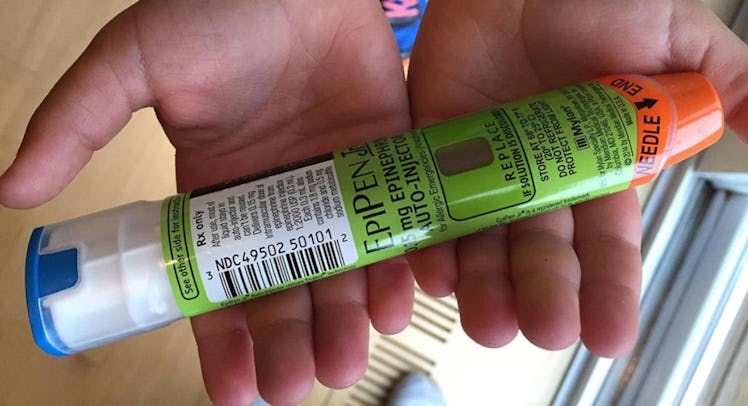Teachers Are Better Than Parents At Keeping Allergic Kids Safe
Study shows kids suffering allergic reactions at home are less likely to get epinephrine prior to ER visits.

Half of the children who suffer a severe allergic reaction at home will likely not receive the life-saving epinephrine injection they need prior to arriving at the ER—but if they’re in school, they’ll likely get the shot. A study from the the American College of Allergy, Asthma and Immunology (ACAAI) suggests that allergic kids may be better off staying at school with their teachers than spending summers with their parent
“We were curious to see what happened in the field prior to when they reached our doors,” coauthor on the study Dr. David Stukus, a pediatric immunologist at Nationwide Children’s Hospital in Ohio and ACAAI spokesperson, told Fatherly. “We were surprised at how infrequently epinephrine was administered. It’s the first line and only treatment for anaphylaxis.”
For the study, Stukus and his colleagues looked at 409 medical records consisting of four years of data from the Nationwide Children’s Hospital. They excluded all records that did not involve allergic reactions, but noted conditions as simple as hives and as profound as anaphylactic shock. Researchers looked into the medical notes on these patients to determine where allergic reactions occurred and, crucially, what happened before the kids arrived at the hospital.
Overall, fewer than half of the children who arrived at the urgent care or ER for an allergic reaction had received an EpiPen injection and, the worse the reaction, the less likely children were to receive the shot that could save their lives. That’s disheartening, because the longer anaphylaxis is allowed to progress without epinephrine, the less effective treatment becomes. But the most interesting finding was that where the child was located at the time of the reaction had a tremendous effect on whether or not they received the medication they needed quickly.
“It was pretty evenly split about where the reactions occurred,” Stukus says. Naturally, most allergic reactions happened either at school or at home. “But it wasn’t evenly split between who got epinephrine in those situations,” he stresses. “Children were about three times more likely to get it at school as opposed to home.”
The reasons for this odd trend—kids with major reactions at home are less likely to get help than kids with minor reactions at school—were beyond the scope of the data collected. But Stukus offers an anecdotal explanation: “I have heard a lot of concern from caregivers about being nervous to inject a needle into their child,” Stukus says. That’s despite most auto-injectors ease of use, automatic dosing, and limited side effects. He notes failure to administer is likely linked to the heightened emotions when a parent sees their child become profoundly sick very quickly. “I’ve had I my own patient’s parents tell me, ‘I knew what I should have done. I was trained on it, but I was too scared to do it.”
How to Keep Your Allergic Kid Safe
- Ensure that you have a hygienic home and minimize your child’s exposure to allergens at school. Most allergic reactions happened either at school or at home.
- Practice epinephrine injection administration with an immunologist and make sure people who will be caring for children with allergies understand how and when to use the device.
- Double check to make sure epinephrine is on hand every time you head out of the house.
School officials, on the other hand, are legally bound to administer medications in a timely and reasonable manner. Many are trained in First Aid and CPR and, let’s face it, they’re less emotional when a kid starts going downhill. Which means children with severe allergies are relatively safe in school—until they go home for summer vacation. “We don’t know if numbers of anaphylaxis increase in the summer,” Stukus says. “But I can tell you that the potential for inappropriate treatment certainly can increase due to the fact that kids are all over the place, with multiple caregivers, who may be unfamiliar with management and recognition of food allergies.”
Stukus encourages parents to double check that children who have been prescribed epinephrine self-injectors have them on hand. They should also practice administration with their immunologist and make sure people who will be caring for children with allergies understand how and when to use the devices. “Accidents occur all the time, through the fault of nobody, and it’s important to be prepared,” Stukus says.
“Summertime presents hectic schedules for all of us.”
This article was originally published on